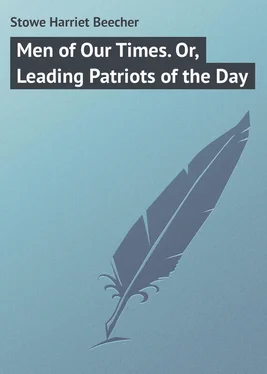Harriet Stowe - Men of Our Times. Or, Leading Patriots of the Day
Здесь есть возможность читать онлайн «Harriet Stowe - Men of Our Times. Or, Leading Patriots of the Day» — ознакомительный отрывок электронной книги совершенно бесплатно, а после прочтения отрывка купить полную версию. В некоторых случаях можно слушать аудио, скачать через торрент в формате fb2 и присутствует краткое содержание. ISBN: , Жанр: foreign_language, foreign_prose, на английском языке. Описание произведения, (предисловие) а так же отзывы посетителей доступны на портале библиотеки ЛибКат.
- Название:Men of Our Times. Or, Leading Patriots of the Day
- Автор:
- Жанр:
- Год:неизвестен
- ISBN:http://www.gutenberg.org/ebooks/46347
- Рейтинг книги:5 / 5. Голосов: 1
-
Избранное:Добавить в избранное
- Отзывы:
-
Ваша оценка:
- 100
- 1
- 2
- 3
- 4
- 5
Men of Our Times. Or, Leading Patriots of the Day: краткое содержание, описание и аннотация
Предлагаем к чтению аннотацию, описание, краткое содержание или предисловие (зависит от того, что написал сам автор книги «Men of Our Times. Or, Leading Patriots of the Day»). Если вы не нашли необходимую информацию о книге — напишите в комментариях, мы постараемся отыскать её.
Men of Our Times. Or, Leading Patriots of the Day — читать онлайн ознакомительный отрывок
Ниже представлен текст книги, разбитый по страницам. Система сохранения места последней прочитанной страницы, позволяет с удобством читать онлайн бесплатно книгу «Men of Our Times. Or, Leading Patriots of the Day», без необходимости каждый раз заново искать на чём Вы остановились. Поставьте закладку, и сможете в любой момент перейти на страницу, на которой закончили чтение.
Интервал:
Закладка:
Then, with careful adherence to the mildest terms possible – could anything be a more peaceful assertion of national right than the simple "hold, occupy and possess"? – he says what the nation will do:
"In doing this there need be no bloodshed or violence, and there shall be none, unless it be forced upon the national authority. The power confided to me will be used to hold, occupy and possess the property and places belonging to the government, and to collect the duties and imposts; but beyond what may be necessary for these objects, there will be no invasion, no using of force against or among the people anywhere."
The remainder of the Inaugural is just such a kindly, homely, earnest, sincere, straight-forward appeal to the South, as he might have made in a country court-house in Illinois, "taking off his coat, leaning upon the rail of the jury box, and singling out a leading juryman and addressing him in a conversational tone." Having stated the case, and once more barely repeated that it was "his duty to administer the present government as it came to his hands, and to transmit it unimpaired by him to his successor," he then quietly but powerfully appeals to his own two life-long trusts, God Almighty, and the free people of America. He asks:
"Why should there not be a patient confidence in the ultimate justice of the people? Is there any better or equal hope in the world? In our present differences, is either party without faith of being in the right? If the Almighty Ruler of nations, with his eternal truth and justice, be on your side of the North, or on yours of the South, that truth and that justice will surely prevail, by the judgment of the great tribunal of the American people."
And the final paragraphs are sad and heavy with his unutterable longings and yearnings for peace; so that the words, plain and simple as they are, are full of deep and melancholy music:
"You can have no conflict without being yourselves the aggressors. You have no oath registered in heaven to destroy the government, while I shall have the most solemn one, to 'preserve, protect and defend' it.
I am loth to close. We are not enemies, but friends. We must not be enemies. Though passion may have strained, it must not break our bonds of affection. The mystic cord of memory, stretching from every battle-field and patriot grave to every living heart and hearthstone all over this broad land, will yet swell the chorus of the Union, when again touched, as surely they will be, by the better angels of our nature."
As the war went on, the same unwavering decision, the same caution and kindness marked the whole action of the Executive. Especially were these traits exhibited in his dealings with the main question at issue, that of slavery.
On this point he bore a pressure such as it is safe to say no mortal son of earth ever bore before or since. The interests of the great laboring, suffering classes that go to make up human nature, were all at this period of history condensed into one narrow channel, like that below Niagara where the waters of all the great lakes are heaped up in ridges, and seem, in Scripture language, to "utter their voices and lift up their hands on high." Like the course of those heavy waters the great cause weltered into a place where its course resembled that sullen whirlpool below the falls where the awful waters go round and round in blindly, dizzy masses, and seem with dumb tossings and dark agonies to seek in vain for a clear, open channel. In this dread vortex, from time to time are seen whirling helplessly the bodies of drowned men, fragments of wrecked boats splintered and shattered, and trees torn to ghastly skeletons, which from time to time dart up from the whirling abyss with a sort of mad, impatient despair.
So we can all remember when the war had struggled on a year or two – when a hundred thousand men, the life and light and joy of as many families, who entered it warm with hope and high in aspiration, were all lying cold and low, and yet without the least apparent progress towards a result – when the resistance only seemed to have become wider, deeper, more concentrated, better organized, by all that awful waste of the best treasures of the nation; then was the starless night – the horror of the valley of the shadow of death. Above, darkness filled with whisperings, and jibes, and sneers of traitor fiends; on one side a pit, on the other a quagmire, and in the gloom all faces gathered blackness, and even friends and partisans looked strangely on each other. Confidence began to be shaken. Each separate party blamed the other as they wandered in the darkness. It was one of the strange coincidences which show the eternal freshness of Scripture language in relation to human events, that the church lesson from the Old Testament which was read in the churches the Sunday after the attack on Sumter, was the prediction of exactly such a conflict:
"Prepare war, wake up the mighty men, let all the men of war draw near; let them come up:
Beat your plough-shares into swords, and your pruning-hooks into spears: let the weak say, I am strong.
Assemble yourselves, and come, all ye heathen, and gather yourselves together round about: thither cause thy mighty ones to come down, O Lord.
Put ye in the sickle, for the harvest is ripe: the press is full, the fats overflow; for their wickedness is great.
Multitudes, multitudes in the valley of decision: for the day of the Lord is near in the valley of decision.
The sun and the moon shall be darkened, and the stars shall withdraw their shining. The Lord also shall roar out of Zion, and utter his voice from Jerusalem; and the heavens and the earth shall shake: but the Lord will be the hope of his people, and the strength of the children of Israel. So shall ye know that I am the Lord your God."
The repeated defeats, disasters, and distresses that had come upon the Union cause stirred the conscience of all the religious portion of the community. They remembered the parallels in the Old Testament where the armies of Israel were turned back before the heathen, because they cherished within themselves some accursed thing – they began to ask whether the Achan who had stolen the wedge of gold and Babylonish vest in our midst was not in truth the cause why God would not go forth with our armies! and the pressure upon Lincoln to end the strife by declaring emancipation, became every day more stringent; at the same time the pressure of every opposing party became equally intense, and Lincoln by his peculiar nature and habits, must listen to all, and take time to ponder and weigh all. In consequence there was a time when he pleased nobody. Each party was incensed at the degree of attention he gave to the other. He might say, in the language of the old prophet, at this time, "Woe is me, my mother, that thou hast borne me a man of strife, and a man of contention to the whole earth! I have neither lent on usury, nor men have lent to me on usury; yet every one of them doth curse me." He was, like the great Master whom he humbly followed, despised and rejected of men, a man of sorrows and acquainted with grief; we hid, as it were, our faces from him, he was despised, and we esteemed him not. Like the poor, dumb, suffering, down-trodden classes for whom he stood, he had no prestige of personal advantages, or of that culture which comes from generations of wealth and ease. His method of thought and expression had not the stamp of any old aristocratic tradition. He was a sign upon the earth – the sign and the leader of a new order of events in which the power and the prestige should be in the hands of the plain, simple common people, and not in those of privileged orders. But the time had not yet come, and now was their hour of humiliation, and while in England the poor operatives of Manchester bravely and manfully bore starvation caused by want of cotton, rather than ask their government to break the blockade and get it for them; while the poor silk weavers of Lyons, and the poorer classes all over Europe trembled, and hoped, and sympathised with the struggling cause and its unfashionable leader – all the great, gay, successful, fashionable world went the other way. Punch had his jolly caricatures of Lincoln's long, thin face, and anxious perplexities, and the caricatures of Paris were none the less merry. Even in America there was a time when some of his most powerful friends doubted his fitness for his position, and criticisms filled the columns of every newspaper. In Washington, every fop and every fool felt at liberty to make a jest at the expense of his want of dignity, and his personal awkwardness. He was freely called an ape, a satyr, a stupid blockhead, for even the ass can kick safely and joyfully at a lion in a net. Even his cabinet and best friends said nothing for him, and kept an ominous and gloomy silence.
Читать дальшеИнтервал:
Закладка:
Похожие книги на «Men of Our Times. Or, Leading Patriots of the Day»
Представляем Вашему вниманию похожие книги на «Men of Our Times. Or, Leading Patriots of the Day» списком для выбора. Мы отобрали схожую по названию и смыслу литературу в надежде предоставить читателям больше вариантов отыскать новые, интересные, ещё непрочитанные произведения.
Обсуждение, отзывы о книге «Men of Our Times. Or, Leading Patriots of the Day» и просто собственные мнения читателей. Оставьте ваши комментарии, напишите, что Вы думаете о произведении, его смысле или главных героях. Укажите что конкретно понравилось, а что нет, и почему Вы так считаете.












